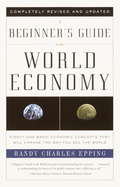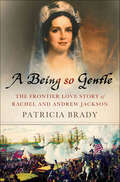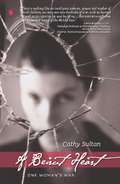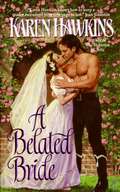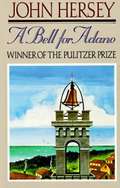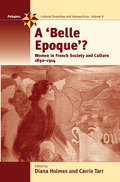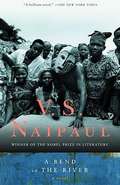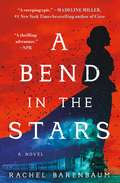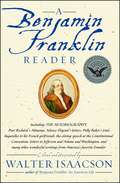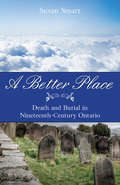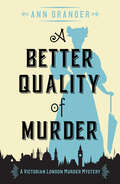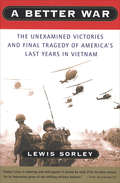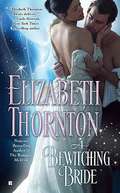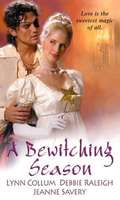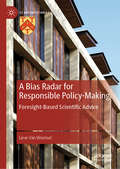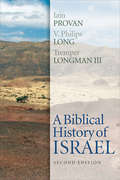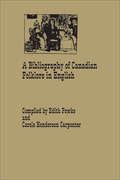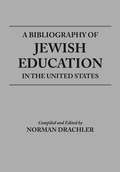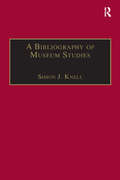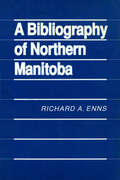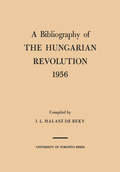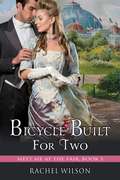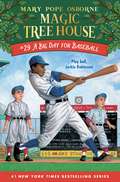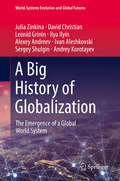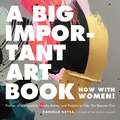- Table View
- List View
A Beginner's Guide to the World Economy
by Randy Charles EppingThe third edition updates the information in previous editions and explains many new concepts. What is the new economy? What is globalization? Is the euro the final seal on European Union? How is e-commerce transforming our world beyond economics? What is virtual money, and does it have real value? How do social concerns and societal ills (drugs, poverty, AIDS, endangered natural resources) play a part in the rapidly changing world economy. What are multinationals, and do they signal the end of nationalism? These and many other pertinent issues are concisely addressed in the most accessible primer for those who want to be economically literate (and who doesn't?).
A Being So Gentle: The Frontier Love Story of Rachel and Andrew Jackson
by Patricia BradyThe forty-year love affair between Rachel and Andrew Jackson parallels a tumultuous period in American history. Andrew Jackson was at the forefront of the American revolution—but he never could have made it without the support of his wife. Beautiful, charismatic, and generous, Rachel Jackson had the courage to go against the mores of her times in the name of love. As the wife of a great general in wartime, she often found herself running their plantation alone and, a true heroine, she took in and raised children orphaned by the war. Like many great love stories, this one ends tragically when Rachel dies only a few weeks after Andrew is elected president. He moved into the White House alone and never remarried. Andrew and Rachel Jackson's devotion to one another is inspiring, and here, in Patricia Brady's vivid prose, their story of love and loss comes to life for the first time.
A Beirut Heart
by Cathy SultanA Beirut Heart is the unforgettable story of an American woman who lived amidst the Lebanese Civil War for eight years and through it all attempted to sustain a life with her Lebanese husband and two small children. It is a memoir that offers a unique illustration of the unsung heroes of war-the women who assume the awesome task of keeping the family united during wartime.The book tells the story of how Cathy Sultan moved with her family to Lebanon in 1969. For six years they led an ideal life experiencing the rich culture, exotic food and breathtaking landscape of the city located along the blue waters of the Mediterranean Sea.After the war began in 1975, their lives changed forever. Sultan recounts how she held the family together by comforting her children after bomb blasts and consoling her physician husband who spent his days treating wounded civilians. To keep sane, she used cooking as her tranquilizer.The unique narrative places us uncomfortably inside something we seldom consider-the domestic element of civil war-and leaves on the reader a permanent impression of the destroyed city and its resilient people.
A Belated Bride (Abduction/Seduction #2)
by Karen HawkinsShe'd Never Marry Him!The last man Arabella Hadley ever wishes to see again is Lucien Deveraux, the handsome, dissolute Duke of Wexford -- who broke her innocent heart years ago and disappeared to London. So when she finds an unconscious man on her deserted country road and sees that it's Lucien, she's tempted to leave him there. But even more appalling than his presence is the brazen kiss he plants on her shocked lips and her response! So it would be totally insane to take him home to recover -- wouldn't it?Except For One Small Thing...Lucien dares not reveal why he's returned to his country estate -- or why he abandoned the strong-willed beauty years ago. Especially since Arabella clearly has secrets of her own. But when her scheming, marriage-minded aunts successfully compromise them, the two are forced to become man and wife. Which makes it ever harder for both to battle the passion that never disappeared...
A Bell for Adano
by John HerseyAn Italian-American major in World War II wins the love and admiration of the local townspeople when he searches for a replacement for the 700 year-old town bell that had been melted down for bullets by the fascists.<P><P> Winner of a 1945 Pulitzer Prize.
A Belle Epoque?
by Diana Holmes Carrie tarrThe Third Republic, known as the 'belle époque', was a period of lively, articulate and surprisingly radical feminist activity in France, borne out of the contradiction between the Republican ideals of liberty, equality and fraternity and the reality of intense and systematic gender discrimination. Yet, it also was a period of intense and varied artistic production, with women disproving the critical nearconsensus that art was a masculine activity by writing, painting, performing, sculpting, and even displaying an interest in the new "seventh art" of cinema. This book explores all these facets of the period, weaving them into a complex, multi-stranded argument about the importance of this rich period of French women's history.
A Bend in the River: Introduction By Patrick Marnham (Vintage International)
by V. S. NaipaulWidely hailed as the Nobel Prize-winning author&’s greatest work, this novel takes us into the life of a young Indian man who moves to an isolated town at the bend of a great river in a newly independent African nation. • "Brilliant." —The New York TimesIn this haunting masterpiece of postcolonial literature, short-listed for the Booker Prize in 1979, Naipaul gives us a convincing and disturbing vision of a place caught between the dangerously alluring modern world and its own tenacious past.Salim is doubly an outsider in his new home—an unnamed country that resembles the Congo—by virtue of his origins in a community of Indian merchants on the coast of East Africa. Uncertain of his future, he has come to take possession of a local trading post he has naively purchased sight unseen. But what Salim discovers on his arrival is a ghost town, reduced to ruins in the wake of the recently departed European colonizers and in the process of being reclaimed by the surrounding forest. Salim struggles to build his business against a backdrop of growing chaos, conflict, ignorance, and poverty. His is a journey into the heart of Africa, into the same territory explored by Joseph Conrad&’s Heart of Darkness nearly eighty years earlier—but witnessed this time from the other side of the tragedy of colonization. Salim discovers that the nation&’s violent legacy persists, through the rise of a dictator who calls himself the people&’s savior but whose regime is built on fear and lies."Confirms Naipaul's position as one of the best writers now at work." —Newsweek
A Bend in the Stars
by Rachel BarenbaumFor fans of All the Light We Cannot See and The Women in the Castle comes a riveting literary novel that is at once an epic love story and a heart-pounding journey across WWI-era Russia, about an ambitious young doctor and her scientist brother in a race against Einstein to solve one of the greatest mysteries of the universe.In Russia, in the summer of 1914, as war with Germany looms and the Czar's army tightens its grip on the local Jewish community, Miri Abramov and her brilliant physicist brother, Vanya, are facing an impossible decision. Since their parents drowned fleeing to America, Miri and Vanya have been raised by their babushka, a famous matchmaker who has taught them to protect themselves at all costs: to fight, to kill if necessary, and always to have an escape plan. But now, with fierce, headstrong Miri on the verge of becoming one of Russia's only female surgeons, and Vanya hoping to solve the final puzzles of Einstein's elusive theory of relativity, can they bear to leave the homeland that has given them so much? Before they have time to make their choice, war is declared and Vanya goes missing, along with Miri's fiancé. Miri braves the firing squad to go looking for them both. As the eclipse that will change history darkens skies across Russia, not only the safety of Miri's own family but the future of science itself hangs in the balance. Grounded in real history -- and inspired by the solar eclipse of 1914 -- A Bend in the Stars offers a heartstopping account of modern science's greatest race amidst the chaos of World War I, and a love story as epic as the railways crossing Russia.
A Benjamin Franklin Reader
by Walter IsaacsonSelected and annotated by the author of the acclaimed Benjamin Franklin: An American Life, this collection of Franklin's writings shows why he was the bestselling author of his day and remains America's favorite Founder and wit. As a twelve-year-old apprentice in his brother's print shop, Benjamin Franklin taught himself to be a writer by taking notes on the works of great essayists such as Addison and Steele, jumbling them up, and then trying to recreate them in his own words. By that method, he recalled in his Autobiography, he was encouraged to think he might become a "tolerable" writer. In fact, he became the best, most popular, and most influential writer in colonial America. His direct and practical prose shaped America's democratic character, and his homespun humor gave birth to the nation's unique brand of crackerbarrel wisdom. This book collects dozens of Franklin's delight-ful essays and letters, along with a complete version of his Autobiography. It includes an introductory essay exploring Franklin's life and impact as a writer, and each piece is accompanied by a preface and notes that provide background, context, and analysis. Through the writings and the introductory essays, the reader can trace the development of Franklin's thinking, along with the birth of the nation he and his pen helped to invent.
A Better Place: Death and Burial in Nineteenth-Century Ontario
by Susan SmartA Better Place describes the practices around death and burial in 19th-century Ontario. Funeral rituals, strong religious beliefs, and a firm conviction that death was a beginning not an end helped the bereaved through their times of loss in a century where death was always close at hand.The book describes the pioneer funeral in detail as well as the factors that changed this simple funeral into the elaborate etiquette-driven Victorian funeral at the end of the century. It includes the sources of various funeral customs, including the origins of embalming that gave rise to the modern-day funeral parlour. The evolution of cemeteries is explained with the beginnings of cemeteries in specific towns given as examples.An understanding of these changing burial rites, many of which might seem strange to us today, is invaluable for the family historian. In addition, the book includes practical suggestions for finding death and burial records throughout the century.
A Better Quality of Murder (The Inspector Ben Ross Mysteries)
by Ann GrangerFrom &“an accomplished veteran&” of crime fiction, a murder mystery set in Victorian London featuring a female sleuth and her detective husband (Kirkus Reviews). As Inspector Ben Ross of Scotland Yard walks homeward one Saturday night in late October 1867, the fog that swirls around him is like a living beast. By the time it has lifted next morning a woman lies murdered in Green Park. Allegra Benedict was the beautiful Italian wife of an art dealer in Piccadilly. But what had she been doing in London that afternoon, and why had she been selling her brooch in the Burlington Arcade just hours before her death? As Ben begins his investigation, his wife Lizzie—with the help of their maid Bessie—looks into Allegra's private life and uncovers more than one reason why someone might want her dead . . .
A Better War: The Unexamined Victories and Final Tragedy of America's Last Years in Vietnam
by Lewis Sorley&“A comprehensive and long-overdue examination of the immediate post–Tet offensive years [from a] first-rate historian.&” —The New York Times Book Review Neglected by scholars and journalists alike, the years of conflict in Vietnam from 1968 to 1975 offer surprises not only about how the war was fought, but about what was achieved. Drawing from thousands of hours of previously unavailable (and still classified) tape-recorded meetings between the highest levels of the American military command in Vietnam, A Better War is an insightful, factual, and superbly documented history of these final years. Through his exclusive access to authoritative materials, award-winning historian Lewis Sorley highlights the dramatic differences in conception, conduct, and—at least for a time—results between the early and later years of the war. Among his most important findings is that while the war was being lost at the peace table and in the U.S. Congress, the soldiers were winning on the ground. Meticulously researched and movingly told, A Better War sheds new light on the Vietnam War.
A Bewitching Bride
by Elizabeth ThorntonWhen those around her begin meeting tragic fates, Kate Cameron knows she's next-until she's rescued by psychic Gavin Hepburn. But after a night of hiding together, Kate is branded a fallen woman and forced into marriage with Gavin-an arrangement that suits Gavin's purpose to do anything it takes to keep Kate safe from a killer haunting her past. For this enigmatic and lonely beauty has become the unexpected love of his life.
A Bewitching Season
by Lynn Collum Debbie Raleigh Jeanne SaveryWhat happens when a mischievous witch meddles with that most powerful enchantment, love? The answer is here in these three spellbinding stories of witchcraft gone wrong-and romance gone quite blissfully right! "The Bewitched Baron" by Lynn Collum When Wyndom Long, Baron Newlyn, a noted botanist who pays little attention to the gaiety of the ton, engages Naomi Clayton as his shy sister's companion, he is startled by the girl he remembers as plain and reserved. Naomi is a sparkling presence in his home, where all sorts of odd things suddenly begin to happen, and a glint of innocent mischief in her eyes makes him wonder if love is meant to feel so magical... "The Bewitchment of Lord Dalford" by Debbie Raleigh Annie Winsome may be a witch, but the mortal world has never lost its fascination for her-and a London Season is too tempting to resist. Believing an innocent potion will polish her bumbling friend Lord Dalford, she is stunned to find him transformed into a charming rogue-one she wants for herself! But when she discovers Dalford has a bit of magic up his own sleeve, she suspects that love may be the most powerful spell of all. "The Reluctant Witch" by Jeanne Savery Lady Samantha Forsythe, the seventh daughter of a seventh daughter, may have been born a witch, but during her first season in Town, she longs to dance and flirt like any other young debutante. Unfortunately, before long Samantha is importuned to read tea leaves and brew love spells. One of which must have gone horribly awry, for Sam realizes that her arrogant neighbor Lord Dalreath has tumbled for her! Why, then, is every moment in his arms so sweetly enchanting?
A Bias Radar for Responsible Policy-Making: Foresight-Based Scientific Advice (St Antony's Series)
by Lieve Van WoenselPolicymakers prepare society for the future and this book provides a practical toolkit for preparing pro-active, future-proof scientific policy advice for them. It explains how to make scientific advisory strategies holistic. It also explains how and where biases, which interfere with the proper functioning of the entire science-policy ecosystem, arise and investigates how emotions and other biases affect the understanding and assessment of scientific evidence. The book advocates explorative foresight, systems thinking, interdisciplinarity, bias awareness and the anticipation of undesirable impacts in policy advising, and it offers practical guidance for them. Written in an accessible style, the book offers provocative reflections on how scientific policy advice should be sensitive to more than scientific evidence. It is both an appealing introductory text for everyone interested in science-based policy and a valuable guide for the experienced scientific adviser and policy scholar.
A Biblical History of Israel
by Tremper Longman III Iain Provan V. Philips LongFor over a decade, A Biblical History of Israel has gathered praise and criticism for its unapologetic approach to reconstructing the historical landscape of ancient Israel through a biblical lens. In this much-anticipated second edition, the authors reassert that the Old Testament should be taken seriously as a historical document alongside other literary and archaeological sources. <p><p> Significantly revised and updated, A Biblical History of Israel, Second Edition includes the authors' direct response to critics. In part 1, the authors review scholarly approaches to the historiography of ancient Israel and negate arguments against using the Bible as a primary source. In part 2, they outline a history of ancient Israel from 2000 to 400 BCE by integrating both biblical and extrabiblical sources. The second edition includes updated archaeological data and new references. The text also provides seven maps and fourteen tables as useful references for students.
A Bibliography of Canadian Folklore in English
by Edith Fowke Carole Henderson-CarpenterThis book is the only comprehensive bibliography of Canadian folklore in English. The 3877 different items are arranged by genres: folktales; folk music and dance; folk speech and naming; superstitions, popular beliefs, folk medicine, and the supernatural; folk life and customs; folk art and material culture; and within genres by ethnic groups: Anglophone and Celtic, Francophone, Indian and Inuit, and other cultural groups. The items include reference books, periodicals, articles, records, films, biographies of scholars and informants, and graduate theses. Each items is annotated through a coding that indicates whether it is academic or popular, its importance to the scholar, and whether it is suitable for young people. The introduction includes a brief survey of Canadian folklore studies, putting this work into academic and social perspective. The book covers all the important items and most minor items dealing with Canadian folklore published in English up to the end of 1979. It is concerned with legitimate Canadian folklore – whether transplanted from other countries and preserved here, or created here to reflect the culture of this country. It distinguishes between authentic folklore presented as collected and popular treatments in which the material has been rewritten by the authors. Intended primarily for scholars of folklore, international as well as Canadian, the book will also be of use to scholars in anthropology, cultural geography, oral history, and other branches of Canadian culture studies, as well as to librarians, teachers, and the general public.
A Bibliography of Jewish Education in the United States
by Norman DrachlerThis book contains entries from thousands of publications whether in English, Hebrew, Yiddish, and German—books, research reports, educational and general periodicals, synagogue histories, conference proceedings, bibliographies, and encyclopedias—on all aspects of Jewish education from pre-school through secondary education
A Bibliography of Museum Studies
by Simon J. KnellA comprehensive bibliographic reference for students and others wishing to investigate the contemporary literature on museums and collections. The references are systematically arranged into sections including collections management, communication and exhibitions, museum education, material culture, the museums profession and museum management. Compiled from the research and teaching materials of the Department of Museum Studies at the University of Leicester it provides an essential resource for anyone studying, or working in, museums. Containing more than 4,000 references, this new bibliography provides ready access to the literature whether you are developing a disaster plan or visitor survey, or studying the history of museum education.
A Bibliography of Northern Manitoba
by Richard A. EnnsMuch has been written about the history and the people of northern Manitoba, but until now this body of work has not been readily accessible to the researcher or teacher. This bibliography identifies published sources, such as books and magazine and journal articles, as well as unpublished sources that are available to the public, including academic theses and government pamphlets, reports, and studies. It includes primarily materials dealing with the area north of 53rd parallel of latitude, but it also includes material on the area east of Lake Winnipeg as far south as the 51st parallel, a region that is similar to the North. References are listed under seven topics: bibliographies and research aids; the fur trade; Aboriginal and Métis populations; exploration and travel accounts; church and mission histories; northern geography and resources; and community histories and twentieth century resource exploitation.
A Bibliography of the Hungarian Revolution, 1956
by Ivan Halasz de BekyThis bibliography is an exhaustive, objective and unique list of sources in the study of an event the historical significance of which becomes continually more apparent. The list consists of over two thousand entries from books and pamphlets, periodical articles, motion pictures and monitored broadcasts. The articles are arranged by language, and the Hungarian and Slavic book entries are provided with English translations.
A Bicycle Built for Two (Meet Me at the Fair #3)
by Rachel WilsonHootchy-kootchy Meets Rich and Snooty in the Delightfully Sweet Americana Romance, Bicycle Built for Two, from Rachel Wilson—1893 Chicago World’s Fair—Hard-working, snobbish, and overbearing, Alex English is proud of his position in the World's Fair Agricultural Forum. When one of the women working as a fortune-teller and stand-in for the dancer, Little Egypt, threatens to upset the wholesome, educational atmosphere, Alex takes umbrage.Kate Finney is working two jobs at the fair to make ends meet and to keep herself and her mother safe from her alcoholic father. But her father pursues her to the fair and then tries to kill her. Mr. Finney is just the sort of nasty element Alex wants kept away from the fair, and if that means Kate must lose her jobs, so be it.But Kate's not going without a fight!Completely vexed by Kate's response, Alex sees the smart, strong, beautiful Kate in a new light. But it takes an unsolicited act of kindness to bridge the gap between their separate worlds and ignite a fire not easily quenched.Publisher's Note: Set in a real time and place, this story is a light and humorous romance about a couple that couldn't be more mismatched. Light on sensuality, this story will be enjoyed by readers who appreciate sweet romance."A BICYCLE BUILT FOR TWO is a rollicking ride into the gay nineties and a look at life on the wrong side of the tracks. Alex is part of the rich aristocracy and quite the snob when it comes to associating with the unfortunate people of the lower classes. He has the absurd idea that the poor are simply down on their luck because they choose to be. He is exasperating and sometimes so naive that he frustrates me. Kate is an acid-tongued young woman who is rude and pushy to the extent you want to shake her out of it. When Alex's rose-colored vision of life meets Kate's everyday reality there is an explosion of fireworks. Alex is brought down to humility and Kate is brought up to the realization that there is kindness in the world. Ms. Duncan has penned a fine adventure. A BICYCLE BUILT FOR TWO is a delightful story and not to be missed!" ~Diana Risso, Romance Reviews TodayThe Meet Me at the Fair SeriesComing Up RosesJust North of BlissA Bicycle Built for Two
A Big Day for Baseball (Magic Tree House #29)
by Ag Ford Mary OsborneMeet Jackie Robinson and solve a mystery in the #1 bestselling Magic Tree House chapter book series! PLAY BALL! Jack and Annie aren’t great baseball players . . . yet! Then Morgan the librarian gives them magical baseball caps that will make them experts. They just need to wear the caps to a special ballgame in Brooklyn, New York. The magic tree house whisks them back to 1947! When they arrive, Jack and Annie find out that they will be batboys in the game—not ballplayers. What exactly does Morgan want them to learn? And what’s so special about this game? They only have nine innings to find out! Discover history, mystery, humor, and baseball in this one-of-a-kind adventure in Mary Pope Osborne’s New York Times bestselling Magic Tree House series lauded by parents and teachers as books that encourage reading. Magic Tree House books, with fiction and nonfiction titles, are perfect for parents and teachers using the Core Curriculum. With a blend of magic, adventure, history, science, danger, and cuteness, the topics range from kid pleasers (pirates, the Titanic, pandas) to curriculum perfect (rain forest, American Revolution, Abraham Lincoln) to seasonal shoo-ins (Halloween, Christmas, Thanksgiving). There is truly something for everyone here! Have more fun with Jack and Annie on the Magic Tree House website at MagicTreeHouse.com!
A Big History of Globalization: The Emergence of a Global World System (World-Systems Evolution and Global Futures)
by David Christian Leonid Grinin Andrey Korotayev Julia Zinkina Ilya Ilyin Alexey Andreev Ivan Aleshkovski Sergey ShulginThis book presents the history of globalization as a network-based story in the context of Big History. Departing from the traditional historic discourse, in which communities, cities, and states serve as the main units of analysis, the authors instead trace the historical emergence, growth, interconnection, and merging of various types of networks that have gradually encompassed the globe. They also focus on the development of certain ideas, processes, institutions, and phenomena that spread through those networks to become truly global.The book specifies five macro-periods in the history of globalization and comprehensively covers the first four, from roughly the 9th – 7th millennia BC to World War I. For each period, it identifies the most important network-related developments that facilitated (or even spurred on) such transitions and had the greatest impacts on the history of globalization.By analyzing the world system's transition to new levels of complexity and connectivity, the book provides valuable insights into the course of Big History and the evolution of human societies.
A Big Important Art Book (Now with Women): Profiles of Unstoppable Female Artists--and Projects to Help You Become One
by Danielle KrysaCelebrate 45 women artists, and gain inspiration for your own practice, with this beautiful exploration of contemporary creators from the founder of The Jealous Curator. Walk into any museum, or open any art book, and you'll probably be left wondering: where are all the women artists? A Big Important Art Book (Now with Women) offers an exciting alternative to this male-dominated art world, showcasing the work of dozens of contemporary women artists alongside creative prompts that will bring out the artist in anyone!This beautiful book energizes and empowers women, both artists and amateurs alike, by providing them with projects and galvanizing stories to ignite their creative fires. Each chapter leads with an assignment that taps into the inner artist, pushing the reader to make exciting new work and blaze her own artistic trail. Interviews, images, and stories from contemporary women artists at the top of their game provide added inspiration, and historical spotlights on art "herstory" tie in the work of pioneering women from the past. With a stunning, gift-forward package and just the right amount of pop culture-infused feminism, this book is sure to capture the imaginations of aspiring women artists.
